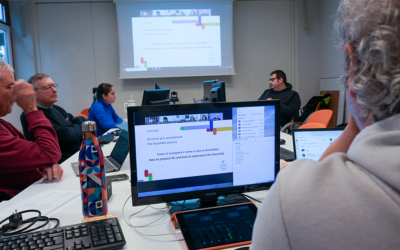![]() “Our land has been devastated by 20 years of civil wars, boy soldiers, violence, exploitation of natural resources, no proactive politics. We are young people who have never known peace. Is there any way we can respond to this challenge? And will our parents, friends and regional authorities be willing to follow us in this crazy adventure?” These ideas led to the formation of a group of Congolese young people who wanted to hold a festival that would send a message using the language of art that would reach highest international levels. A petition was also sent to the Secretary General of the United Nations, Ban Ki-moon.
“Our land has been devastated by 20 years of civil wars, boy soldiers, violence, exploitation of natural resources, no proactive politics. We are young people who have never known peace. Is there any way we can respond to this challenge? And will our parents, friends and regional authorities be willing to follow us in this crazy adventure?” These ideas led to the formation of a group of Congolese young people who wanted to hold a festival that would send a message using the language of art that would reach highest international levels. A petition was also sent to the Secretary General of the United Nations, Ban Ki-moon.
“Our land is fertile, water is abundant and the subsoil a gift from God: North Kivu could be an earthly paradise. We young people would like to build it.” They called it their mission. Two years went into preparations and on February 14-16, 2014, the Amani Festival was held in Goma, Democratic Republic of Congo (amani means peace in Swahili). They sang of their suffering and hope, proclaiming their message to an audience of 25,000 people: politicians, international representatives and UN peacekeepers.
Young people from the Focolare Movement were among the promoters and animators of the event. Belamy Paluku is from the Gen Fire Band in Goma, and in charge of the artistic performances. He states: This festival has been the realization of a great dream: to gather many people and proclaim a message of unity together being advocates of the forgotten people in society. Not only did these artists offer their own points of view, but they come from countries that are at war with one another, and they gave a strong witness of brotherhood and peace from the same stage. I hope this will be the beginning of a new step.”
Many participated in the preparation of the festival, both onstage and behind the scenes. There were those who churned out biscuits and gouffres, those who served the food and those who served the drinks. Everyone worked hard and friendly smiles were everywhere,” says Jean Claude Wenga, who was in charge of communications at the festival.
“I wanted to see what was happening in the culture outside my country and how we might build relationships through cultural exchange,” explains Aurelia from the Focolare, “that’s why I wanted to take part in this event.”
Even adults were not indifferent to the event: “Andre Katoto, the father from one local family commented: “Amani means peace. With this festival we wanted to celebrate peace here in our region.”




0 Comments